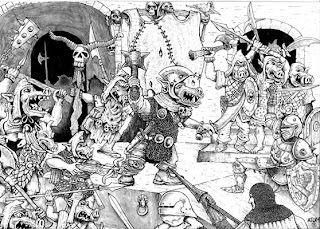Gnolls in Dungeons & Dragons
Physical description
In the Dungeons & Dragons fantasy role-playing game, gnolls greatly resemble hyenas[1]. They are usually between seven and eight feet tall, weighing around 250 to 320 pounds,[2] and use armor made of horn, metal, or leather[1]. Gnolls are generally depicted in the game world as feral nomads who kill and pillage without warning[3]. Their whole bodies are covered in reddish-brown fur which becomes shorter as it surrounds their faces and clawed hands to reveal grey colored skin. Their pelts vary from mono-colored to spotted and their eyes are either yellow or black.
Within the context of the Dungeons & Dragons game, one notable subrace of gnoll is the flind (alternately spelled flynd), which is shorter, broader, and stronger than other gnolls[4]; flinds are often found leading a tribe or settlement of gnolls[4]. Flinds use a nunchaku-like weapon called a flindbar, which consists of a pair of metal rods linked together by a chain[4].
Gnolls in most Dungeons & Dragons settings are worshippers of the demon lord Yeenoghu, who also holds domain over ghouls. Gnolls indulge in humanoid flesh in imitation of this aspect.[5].
Gnolls are the literary descendants of Lord Dunsany's "gnoles", who were clever, evil and nonhuman. Gary Gygax writes in the earliest edition of "Dungeons & Dragons" (1974): "A cross between gnomes and trolls (...perhaps, Lord Dunsany did not really make it all that clear) with +2 morale. Otherwise they are similar to hobgoblins..." [6]
Dungeons & Dragons (1974-1976)
The gnoll was introduced in the earliest edition of the game, in the Dungeons & Dragons "white box" set (1974), where they were described as a "cross between gnomesand trolls." [7]
Advanced Dungeons & Dragons 1st edition (1977-1988)
With the 1977 publication of Gygax's Advanced Dungeons & Dragons Monster Manual gnolls were described as hyena-men, a characterization that continues to the present.[1] This book also describes Yeenoghu, a demon lord that many gnolls devote themselves to.
The flind, a more intelligent but less physically powerful relative to the more common gnoll, was introduced in the Fiend Folio (1981)[8]
The mythology and attitudes of the gnolls are described in detail in Dragon #63 (July 1982), in Roger E. Moore's article, "The Humanoids."[9] The article also describes theshoosuva, servants of Yeenoghu that have characteristics of both gnolls and ghouls.
The first "Creature Catalog" article, an insert in Dragon #89 (September 1984), featured the ghuuna, a lycanthrope-like creature that could transform between a gnoll andhyaenodon form.
Dungeons & Dragons (1977-1999)
This edition of the D&D game included its own version of the gnoll, in the Dungeons & Dragons Basic Set (1977, 1981, 1983).[10][11][12] The gnoll was featured as a player character race in the Orcs of Thar gazetteer (1989). Gnolls were also later featured in the Dungeons & Dragons Game set (1991), the Dungeons & Dragons Rules Cyclopedia (1991),[13] the Classic Dungeons & Dragons Game set (1994), and the Dungeons & Dragons Adventure Game set (1999).
Advanced Dungeons & Dragons 2nd edition (1989-1999)
The gnoll and flind appear first in the Monstrous Compendium Volume One (1989),[14] and are reprinted in the Monstrous Manual (1993).[15]
The flind is also detailed in Dragon #173 (September 1991), in "The Sociology of the Flind," a variation on the "Ecology of..." column.[16]
The gnoll and flind are detailed as playable character races in The Complete Book of Humanoids (1993).[17] The gnoll and flind are later presented as playable character races again in Player's Option: Skills & Powers (1995).
Dungeons & Dragons 3.0 edition (2000-2002)
The gnoll appears in the Monster Manual for this edition (2000).[18]
Dungeons & Dragons 3.5 edition (2003-2007)
The gnoll appears in the revised Monster Manual for this edition (2003).[2]
The flind appears in Monster Manual III (2004).[4]
Dungeons & Dragons 4th edition (2008-)
The gnoll appears in the Monster Manual for this edition (2008), including the gnoll huntmaster, the gnoll claw fighter, the gnoll marauder, and the gnoll demonic scourge.[3]
The gnoll was later released as a supported 4th edition player race in Dragon #367.[19]





Comments
Post a Comment